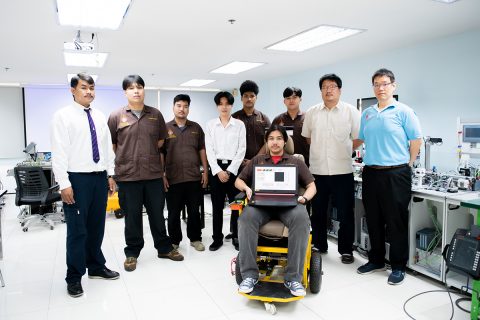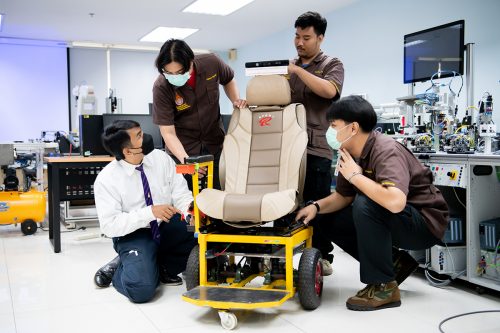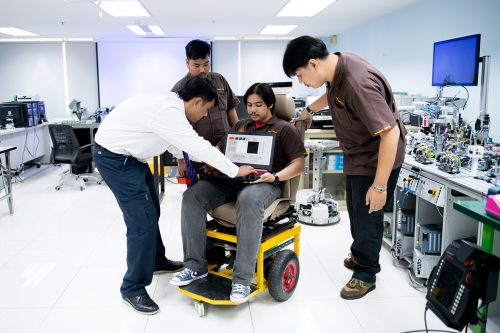
Currently, Thailand has bedridden patients who are unable to help themselves due to paralysis, paralysis, or Parkinson’s disease. At a rate of 63,000 patients per million people, and since the sick are unable to help themselves. As a result, equipment to ease patient movement, such as wheelchairs, is required, and patients must be continuously monitored.
As a result, mechanical engineering students Mr. Sukrit Chamaiklang and Mr. Issara Chantapanya of Rajamangala University of Technology Phra Nakhon developed the concept of designing a wheelchair to move patients on foot, for remote control, to facilitate and reduce the burden on caregivers in moving patients to bed in the hospital area or nursing home without the need to call anyone for assistance. Dr. Wicha Uppai and Ajarn Kraisak Pothongkam are project consultants.
According to Mr. Issara, the wheelchair is intended to transfer the patient. It is designed for use in healthcare facilities where patient care is required in order to reduce the team’s work in moving the patient. People must be pushed due to the limitations of ordinary wheelchairs. Alternatively, the patient must exert force on the steering wheel to change directions to different destinations. Furthermore, the price of electric wheelchairs on the market is quite high. And the utilization is rather difficult, and it still does not meet the actual expectations of use.
The wheelchair operation is an automated control that detects movement or impediments using the Kinect Xbox 360 camera and an ultrasonic sensor. The walking distance between the wheelchair and the caregiver is measured in the same manner as a human eye would. The controller is a fuzzy logic controller that functions like a brain, making choices to guide the wheelchair to its destination. The data is processed by the LabVIEW program, which sends a control signal to the Arduino board, which drives the wheels while walking.
Mr. Sukrit added that the wheelchair body structure has a width of 500 mm, a length of 658 mm, and a height of 305 mm. The car weighs 50 kilograms and is powered by two 12-volt batteries. It goes through a 360-degree turn test, a hill climbing test, and obstacle movement testing. The wheelchair can reach a maximum speed of 3 km/h, climb a slope of 17 degrees, overcome obstacles of up to 3 millimeters, have a control distance of no more than 120 meters, and transport a maximum patient weight of 120 kilos, according to the test results.


Finally, the results of the tests show that the wheelchair patients can walk well. The wheelchair moves directly inside 10 meters in 17 seconds. The pedestrian and the wheelchair have a speed of 0.58 m/s, and the pedestrian may stop the wheelchair by simply slowing down until it stops.
According to Dr. Vicha, this wheelchair is also a prototype that has to be modified in order to be complete, modern, accurate, and capable of supporting a wider range of applications. The cart will be modified in the future to make it easier to use by replacing the notebook PCs used in the current test with industrial computers or small computers. Improve the cart’s ability to generate maps and have its own navigation system, including bringing in an artificial intelligence system or AI to help control orders. so that the wheelchair may travel to the right areas without the aid of a guided walker or caretaker.
“I am proud of my students’ eagerness to share their knowledge in the classroom.” to employ in the building of a variety of works, and students were able to put this theory into reality at graduation. As a professional industrial engineer, according to the program’s purpose of generating graduates. However, I will always teach students that failing is acceptable. Because failure offers us with experience and information that we can use to advance. Also, what did you learn today? What will come in handy in the future? I’m thrilled that what I teach provides them a look into their own destiny. Knowledge is a weapon that may be used to make a living and support one’s family.” For additional information, contact Mechanical Engineering, Faculty of Industrial Education, RMUTP, Tel. 089 663 0472.
